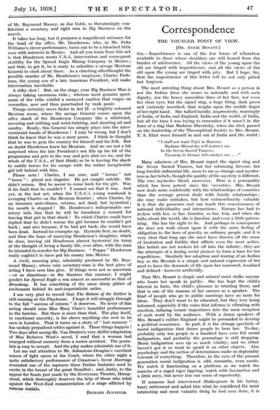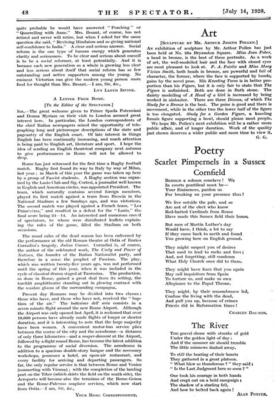Correspondence
SIR,—Impertinence is one of the few forms of relaxation available to those whose shoulders are still bowed from the burden of adolescence. All the views of the young upon the old are tinged with impertinence, and all the views of the old upon the young are tinged with pity. But I hope, Sir, that the impertinence of this letter will be not only pitied but forgiven.
The most arresting thing about Mrs. Besant as a person is not the Indian dress she wears so naturally and with such dignity, nor the heavy masculine lines of her face, nor even her clear eyes, but the signet ring, a huge thing, dark green and curiously inscribed, that weighs upon the middle finger of her right hand. She talked lucidly, impressively, warningly of India, of India and England, India and the world, of India, but all the time I was trying to remember if it wasn't in the form of a ring that Madame Blavatsky, when she died, passed on the leadership of the Theosophical Society to Mrs. Besant. T. S. Eliot wove himself in and out of India and the world : "I shall not want Pipit in Heaven:
Madame Blavatsky will instruct me In the Seven Sacred Trances ; Piccarda de Donati will conduct me. . .."
Many admirers of Mrs. Besant regret the signet ring and the Seven Sacred Trances, but her reforming fervour, her long forcible influential life, seem to me as strange and myster- ious as her beliefs, though the quality of the mystery is different. The two mysteries blend, moreover. Here is a personality which has been potent since the 'seventies. Mrs. Besant now deals more confidently with the relationships of countries than the average person deals with family relationships ; she may make mistakes, but how extraordinarily valuable it is that she possesses and can teach this consciousness of national individuality and interactions. Europe has had to reckon with her, so has America, so has Asia, and when she talks about the world, she is familiar, and even a little patron- izing. She has the right to be. And perhaps in consequence she does not walk about upon it with the same feeling of obligation to the laws of gravity as ordinary people, and it is very clear that long ago she must have thrown off the sense of limitation and futility that afflicts even the most active. Her beliefs are not rockets let off into the infinite; they are the attempts of a daring social pioneer to form a base for her expeditions. Similarly her adoption and rearing of an Indian boy as the Messiah is a simple and natural expression of her need to have the demands of life upon her narrowed, localized and defined—however artificially.
That Mrs. Besant is simple and natural must strike anyone who hears her speak in public. She has kept the child's interest in facts, the child's pleasure in retailing them, and that is one of the reasons of her success as a speaker. The kind of people who go to public meetings have no taste for ideas. They don't want to be educated, but they love being informed, especially if the voice that informs is vibrating with emotion, infusing cosmic importance into the mere reception of each word by the audience. With a dozen speakers of Mrs. Besant's calibre England might be persuaded to develop a political conscience. In part, it is the strange spectacle of moral indignation that draws people to hear her. To-day, probably only ten people in a hundred have ever felt moral indignation, and probably the percentage is still dropping. Moral indignation uses up so much vitality, and we either haven't got it or want to spend it on other objects. Also psychology and the notion of determinism make us deplorably tolerant of everything. Therefore, in the eyes of the present generation moral indignation is odd, romantic, even exotic. We watch it functioning on a platform as we watch the muscles of a caged tiger rippling, watch with fascination and a little envy, but never lose our sense of superiority.
If someone had interviewed Shakespeare in his balmy, beery retirement and asked him what he considered the most interesting and most valuable thing he had ever done, it is
quite probable he would have answered " Poaching " or " Quarrelling with Anne." Mrs. Besant, of course, has not retired and never will retire, but when I asked her the same question she said, " Reviving Hinduism and so giving national self-confidence to India." A clear and serious answer. Social reform is the one type of human energy which generates clarity and seriousness. To be clear and serious about oneself is to be a social reformer, at least potentially. And it is because each new generation as a whole is growing less clear and less serious about itself that social reform has so few outstanding and active supporters among the young. No eminent Victorian can give the modern young person more food for thought than Mrs. Besant.—I am, Sir, &c., LYN LLOYD IRVINE.





































 Previous page
Previous page